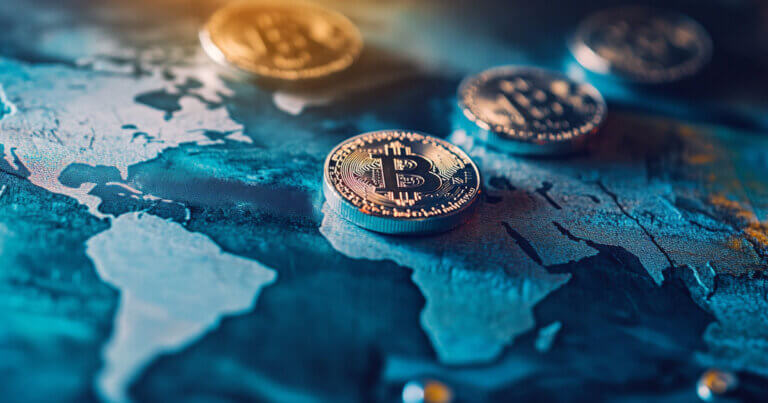
The U.S. dollar has been the world’s dominant reserve currency for decades, serving as the currency of choice for international commerce, national wealth storage, and the pricing of essential commodities. Nevertheless, a provocative query is gaining traction in economic circles, crypto forums, and global summits as trust in fiat systems erodes and digital assets gain traction:
**Is it possible for a cryptocurrency to become the world’s next reserve currency?**
It is an unconventional concept. However, it is worth conducting a thorough examination in the face of inflationary concerns, geopolitical fragmentation, and rapid technological advancements. Is the world prepared for a **global crypto reserve currency**? If so, what would it resemble and who would lend their backing?
💱 What is a reserve currency, exactly?
A **reserve currency** is a currency that is maintained in significant quantities by governments and institutions to support trade and ensure currency stability. Its distinguishing characteristics include:
* **Global trust and liquidity** * **Widespread use in trade and finance** * **Backed by robust, stable institutions** * **Deep capital markets**
At present, the **U.S. dollar** is the dominant currency, accounting for over 58% of global reserves. Followed by the yen, euro, and yuan. However, cryptocurrencies are gradually becoming a part of the conversation—not as replacements, but as alternatives or complements.
🌐 The Argument in Favor of a Global Crypto Reserve Currency
1. **Trustless Stability = Decentralization**
In contrast to fiat currencies, which are reliant on governments and central banks, numerous cryptocurrencies are **decentralized**. A crypto reserve currency would not be susceptible to the inflationary policy, geopolitical agenda, or political instability of a single nation.
This may be of interest to countries and institutions that are seeking to mitigate sovereign risk.
2. **Neutral and Borderless**
The ownership of a global crypto reserve currency would not be restricted to a single nation. It would be a neutral asset that supports international trade in a genuinely global sense, existing outside of political control.
This renders it potentially appealing to emergent markets that are interested in reducing their dependence on the euro or the U.S. dollar.
3. **Fast, Programmable, and Transparent**
Blockchains provide auditable settlements that are nearly instantaneous. A crypto reserve currency has the potential to reduce friction in global payments, **decrease costs**, and **increase accountability** in financial flows, particularly when implemented by central banks or multilateral institutions.
🧱 What would it require?
Several criteria must be satisfied for a cryptocurrency to be designated as a global reserve asset:
This suggests that **Bitcoin**, despite its market capitalization dominance, may not satisfy all criteria. In the short term, it may be more feasible to utilize a **stablecoin**, a **basket-backed asset**, or a **tokenized SDR** (Special Drawing Rights).
For a cryptocurrency to become a global reserve asset, several criteria must be met:
| Requirement | Implication |
|---|---|
| Price stability | It must not be subject to wild volatility (likely excludes Bitcoin for now). |
| Global regulatory acceptance | Governments must agree on its legal use and status. |
| Deep liquidity and market depth | It must be easily tradable in large volumes. |
| Institutional trust | Central banks and sovereign wealth funds must be willing to hold it. |
| Interoperability with financial systems | Must integrate with traditional banking infrastructure. |
🏛️ Who Has the Potential to Lead the Charge?
**IMF**: As a neutral reserve asset, it is possible to investigate a **digital SDR** that is tokenized and blockchain-based.
* **Nations of the BRICS bloc**: Are reportedly in the process of devising alternatives to the dollar; a blockchain-based solution could be appealing to alignments outside of the Western world.
* **Private consortiums**: Such as those responsible for the former Libra (now Diem), they may attempt to reestablish themselves with enhanced conformance and decentralization.
* **Decentralized DAOs**: In a scenario that is genuinely crypto-native, a decentralized autonomous organization (DAO) could supervise a global reserve token that is constructed on trustless code.
⚖️ Continuing Obstacles
Nevertheless, substantial obstacles persist, despite the potential:
* **Volatility**: The majority of cryptocurrencies are too volatile to function as reliable reserves.
* **Geopolitical resistance**: Dominant economies may be reluctant to relinquish control.
* **Technical obstacles**: The process of scaling blockchains to accommodate global volume is still in progress.
* **Regulatory fragmentation**: There is currently no global consensus regarding the treatment of cryptocurrency.
And perhaps most importantly, **trust**—central banks may be hesitant to base their monetary policy on code that was written by anonymous developers or governed by unverified DAOs.
🔮 Does the Future Favor Hybrid Models?
Rather than a singular crypto reserve currency, **hybrid systems** may emerge:
* **Public blockchains issue tokenized fiat reserves**.
* **CBDCs that are interoperable and coordinated across borders**.
* **Algorithmic stablecoins**, which are supported by commodities or baskets of fiat assets.
* **Multi-chain global settlement systems**, in which crypto serves as a critical infrastructural component without replacing national currencies.
Final Thoughts: Are You Prepared?
Therefore, is the world prepared?
**In a technological sense, absolutely. Not yet, both economically and politically.** However, the extent of readiness may not be a factor if demand increases. The demand for a **neutral, transnational, programmable reserve asset** will only continue to rise as cross-border tensions escalate and fiat systems experience instability.
Yes, the world may indeed be on the cusp of a **crypto-reserved reality** if crypto can resolve its volatility, scalability, and trust challenges, and if global institutions are willing to collaborate.
**What are your thoughts? Is it possible for the subsequent global reserve currency to be digital, decentralized, and crypto-native? Alternatively, will nation-states increase their reliance on central banks and fiat? Please express your opinions in the comments section below. **
Leave a Reply